The post Cigy’s story – a tale of hope from Rwanda appeared first on Hope and Homes for Children.
]]>When Cigy was born with disabilities, Mutoni did everything she could to support her daughter. She worked hard and took Cigy to nearby health facilities for care. But the pressure was immense, and her husband rejected Cigy completely. Mutoni’s marriage ended, and she moved in with her mother, who helped her with Cigy and her two other young children.
Tragedy struck when Mutoni’s mother died, and local people convinced Mutoni to send Cigy to a residential institution for children with disabilities. Mutoni was heartbroken to send her daughter away, but she believed it was the best possible thing for her child.
Life in the orphanage was grim. Cigy was severely neglected and lived in appalling conditions. Instead of playing with other children, she was bedbound and unable to move. “When I visited her,” Mutoni says, “the stink was so overwhelming that I couldn’t stay inside.”
Mutoni desperately wanted Cigy back with her family, but she feared she would be unable to provide the care her daughter needed. Our team stepped in to provide advice, emotional support, and practical help so the family felt confident in caring for Cigy once she returned.
To ensure the family had a stable foundation, we bought them a home, giving them security and dignity. We also helped Mutoni start her own business selling clothes, which increased the family’s income and financial independence.
We arranged regular physiotherapy sessions for Cigy, which began an incredible transformation. Within just three months of leaving the orphanage, she had gained 10 kilograms, regained the use of her hands and upper body, and had begun to dance and respond to signals and sounds again.
“You not only brought my daughter back to me – you gave us a home, a way to survive, and the strength to live again as a family.”
Mutoni, Cigy’s mum
Today, Cigy is thriving with the protection and care only a loving family can provide. “She looks like the child I remember before she was placed in the institution,” Mutoni says. Richard Munyaneza, Safeguarding Coordinator at Hope and Homes for Children Rwanda, recalls, “When I first met Mutoni, she was very sad and unsure if she could care for Cigy. Now, seeing her happy and Cigy enjoying life with her family is amazing. It shows how much can change with the right support.”
Photo credit: Richard Munyaneza/Hope and Homes for Children
*To ensure the safety and privacy of the people we support, the names of the children and relatives featured in this story have been changed.
The post Cigy’s story – a tale of hope from Rwanda appeared first on Hope and Homes for Children.
]]>The post “I started to develop self-confidence and love” – Ombi’s story from the Adolescent Mother Project appeared first on Hope and Homes for Children.
]]>When Ombi found out she was pregnant she was terrified. Still in secondary school, she dropped out of school and stayed at home.
Shamed for being young, pregnant and unmarried, Ombi was suffering. Until your donations helped her get back on her feet.

Jean Bizimana / Hope and Homes for Children
Finding support
The next few months were some of the darkest in Ombi’s life. She was unemployed, out of school and with a newborn baby to raise. Worse, she received no support from her family.
Thankfully, that’s when she found the Adolescent Mother Project.
What is the Adolescent Mother Project
The Adolescent Mother Project is our support network for young, vulnerable women in Kigali.
In Rwanda, adolescent pregnancy has become a major national topic. Facing unemployment, poverty or discrimination, young women are at risk of giving up their babies. That means more children pushed into institutionalised care. More homes being torn apart.
But every child deserves to grow up with the love of family. And every young mother deserves independence. By supporting adolescent mothers in Kigali, we’re tackling gender-based discrimination head on – keeping families together, and children out of orphanages.
And thanks to your donations, it’s working.
How does the Adolescent Mother Project work?
Our team works with community leaders to find and refer vulnerable young women in the community. Many have endured poverty, sexual abuse or food scarcity. Many have no support from their family members.
First, we provide financial support to ensure they have a roof over their heads, food on the table, and anything they need for their baby. Then, we invite them to our community hubs, where we provide counselling, family mediation, and whatever support they need to get back into school. Our team even provides grants to help adolescent mothers set up a small business.
Every adolescent mother we support is different, as are their paths to independence. But thanks to your support, we’re helping them pave their own way.
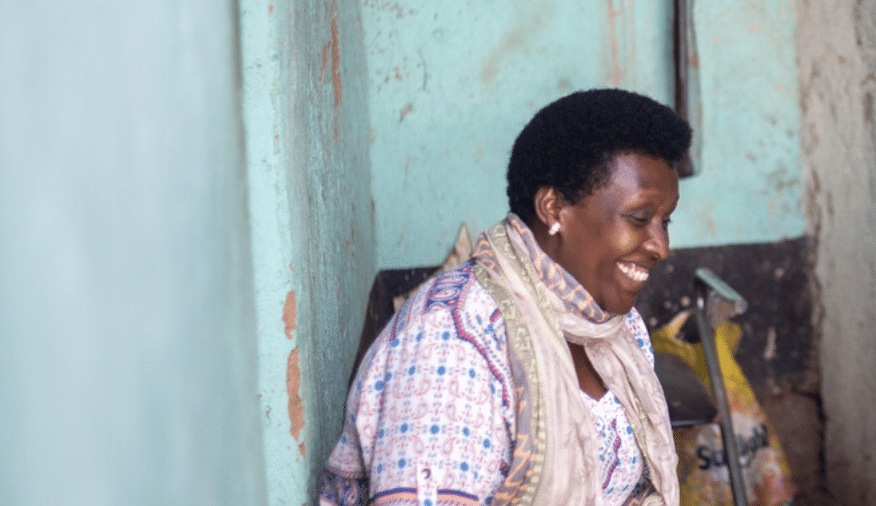
Jean Bizimana / Hope and Homes for Children
Sharing, healing and comfort
After being referred to the Project, our team invited Ombi to her first group counselling session. When she walked into the room and saw other young women in a similar situation, she was shocked. She realised she wasn’t alone.
“I was helped to overcome fear, shame, and the feeling of isolation from society,” she says. “In group therapy sessions with hundreds of peers, we talked, shared critical experiences, healed each other, and comforted each other. I began to see myself as a normal person, not a burden to my family or a source of shame. I started to develop confidence and self-love.”
“I started to develop confidence and self-love.
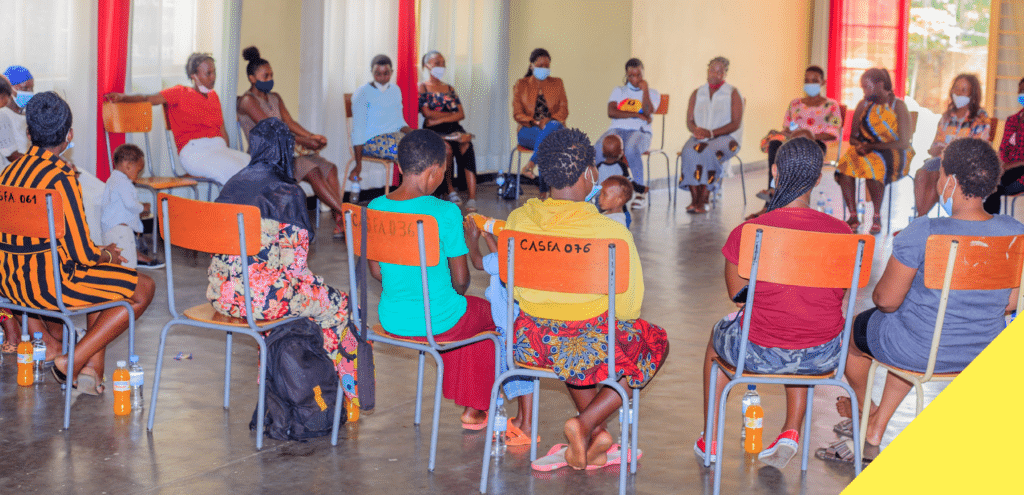
Hope and Homes for Children
“My mother was also invited to a meeting at the community hub, along with other adolescent mothers and their parents,” she continues. “We discussed issues like fighting, discrimination, positive communication in the family, and the importance of forgiveness and understanding.”
With help from our team, their relationship improved. “My mother began to take care of my son and started talking to me again. A good mood returned to our home, and now my mother looks after my son while I work.”
Looking to the future
Thanks to your support, everything’s now changed for Ombi. Your donations helped her go back to school, get a qualification, and find a job in a local salon. Now, she’s saving money, supporting herself, and, most importantly, raising her son with pride.
“I love my son, and I want him to prosper,” she says. “I am confident that I will achieve greater success than I have today. And as I grow and accumulate wealth, I want to create my own project to support adolescent mothers. This is my grand aspiration.”
“I love my son, and I want him to prosper,”
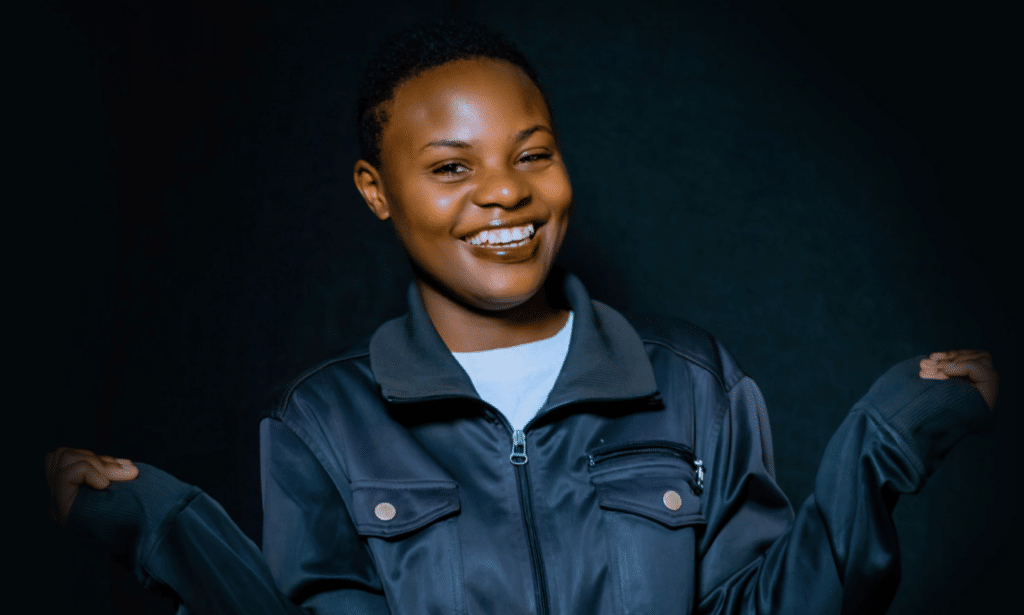
Hope and Homes for Children
Looking back on the Adolescent Mother Project
Thanks to your continued support, our team in Rwanda has supported 252 young women through the Adolescent Mother Project. That’s 252 women, just like Ombi, who got the chance to reclaim their future. And the impact speaks for itself.
“When we met them, none of the girls were in school or even getting two meals a day. Only 15% had family support and 60% didn’t have enough money to take care of their children,” says Innocent Habimfura, Director of Hope and Homes for Children Rwanda . “Now, everything’s different. 80% are back in school, 94% have support from their families, and 92% have jobs allowing them to support themselves and their babies.”
“80% are back in school, 94% have support from their families, and 92% have jobs allowing them to support themselves and their babies.”
Innocent Habimfura
Now, we’re looking at replicating the Adolescent Mother Project across Rwanda, empowering an entire generation of young women. Thanks to your donations, we’re building a better tomorrow. A tomorrow where young women can be, and will be, anything they want to be.
If you’d like to hear more about our stories about the Adolescent Mother Project, as well as more heartwarming examples of the impact of your donations, sign up to our Mailing List. We’ll keep you up-to-date as we bring strength and stability #BackToFamily.
Join the Mailing List
* Names changed to protect identity.
This blog was updated in May 2025 to reflect our shift in language from “teenage mothers” to “adolescent mothers”, in line with our commitment to more respectful and non-stigmatising terminology.
The post “I started to develop self-confidence and love” – Ombi’s story from the Adolescent Mother Project appeared first on Hope and Homes for Children.
]]>The post Watch now: Divine’s incredible journey Back to Family appeared first on Hope and Homes for Children.
]]>Thanks to your donations, Divine is happy again. Out of the orphanage. Back to those who love her. Back to family. Watch her incredible feature for insight into the incredible impacts of your donations.
Watch now: Divine’s Journey Back to Family
Will you help get millions of separated children #BackToFamily? Donate today.
Today, Divine’s living her life as a confident young woman. Surrounded by family. Surrounded by love.
Divine’s story – life inside an orphanage
Divine, who was born with disabilities, spent nine years alone in an orphanage. Like 80% of children in institutional care, she wasn’t an orphan. She had family, family who just needed support. Divine’s mother, Mahoro*, remembers when Divine was sent away.
“It was so difficult for me to take care of her. I needed assistance for her medical care.”
Mahoro, Divine’s mum.
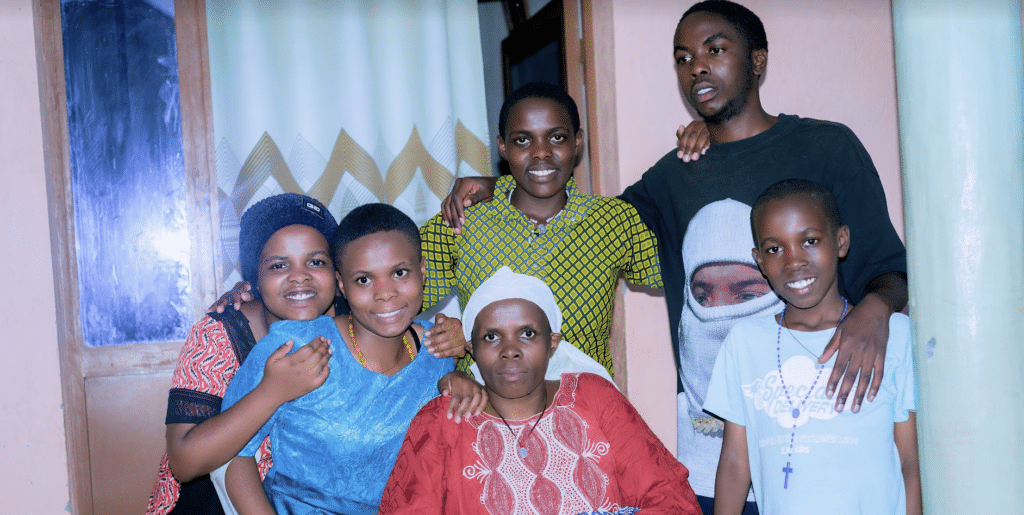
Joas Mvukiyehe / Hope and Homes for Children
Mahoro was seriously ill at the time, and needed help to support Divine’s development. Instead of receiving help, her family was torn apart. And Divine lost huge swathes of her childhood inside an orphanage. Neglected. Alone.
“Life in the institution is so hard, and constantly hearing that you are an orphan even though you have parents hurts so much. Having brothers and sisters, and being the only family member living in an institution – you wonder what you have done wrong to end up there.”
Divine
Coming back to family
Thankfully, people like you stepped in to help. Mahoro received the support she needed all those years ago. And Divine was finally able to go home. Gisa*, one of our social workers in Rwanda, remembers when Divine found out she was going back to family.
“The day before she went home, she was very anxious. She folded her clothes so carefully and packed her bag early. She kept asking if things with her family and caseworkers might change, and if she might not go home after all.”
Gisa, Hope and Homes for Children Social Worker
Thanks to your donations, everything went right on track. Divine came home from the orphanage. After nine long years, back to family.
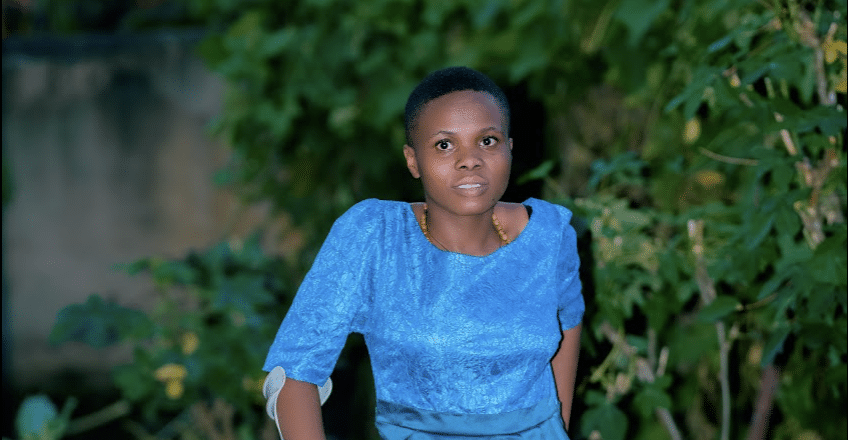
Joas Mvukiyehe / Hope and Homes for Children
Learn more about how we bring children like Divine back to family.
The importance of home
Now she’s back home, Divine’s life has changed immeasurably. She looks back on those days in the orphanage with a sense of sadness, reflecting on the 5.4 million children who still remain trapped inside.
“If you remain inside an orphanage, your ability to learn will be limited,” says Divine. “You’d grow up lacking essential life skills. But when in a family, you’re in a place where you’re supposed to be, as a human. Where you learn skills, where you prepare for independence in later life, to rely on yourself without parents’ support.”
Learn more about how orphanages harm children.
When in a family, you’re in a place you’re supposed to be, as a human.
Divine
Once neglected and alone, Divine now has the power to grow. Because when you’re loved, you’re limitless.
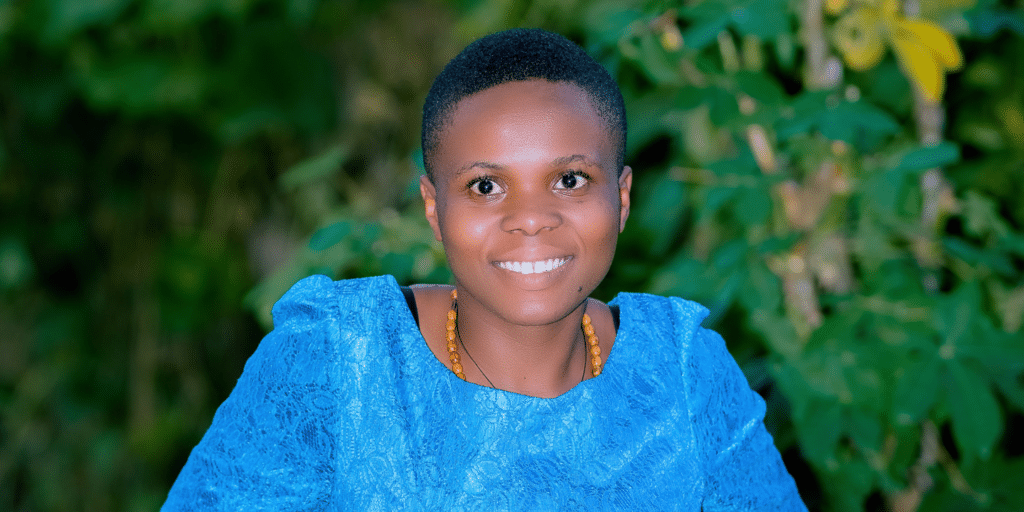
Joas Mvukiyehe / Hope and Homes for Children
Looking to the future
Today, Divine’s got great hopes for the future. She wants to pursue her education and realise her dreams.Divine’s ambitious, confident, and determined to advocate for change for people experiencing the same things she did.
“By God’s grace, I’ll become a journalist, or I’ll study law. I want to advocate for people in justice, mainly people with disabilities, because things are not advancing. There are some things people don’t know, but I, as someone who lived in an institution, know them. I can understand the challenges these people encounter, and what they can do as a response. That’s what I want to do.”
Divine
And now that she’s back to family, that’s exactly what she’ll do.

Joas Mvukiyehe / Hope and Homes for Children
Your generosity got Divine #BackToFamily. Now, will you help millions more children like her? Donate today.
Right now, 5.4 million children are trapped inside orphanages. Children like Divine. Together, we can help children get back to family.
Head to our donation page and make a gift today.
* Names changed to protect identity.
Join the movement Bring separated children back to family
Help millions of children like Divine.
The post Watch now: Divine’s incredible journey Back to Family appeared first on Hope and Homes for Children.
]]>The post Empowering stories from the Adolescent Mother Project – “It felt like a family” appeared first on Hope and Homes for Children.
]]>An unmarried adolescent mother can face huge discrimination and prejudice. They’re at risk of being rejected by their families, dropping out of school, facing unemployment, or even abandoning their children just to survive.
That’s why we launched the Adolescent Mother Project in 2021, working with the Rwandan government and local leader to find, counsel and support vulnerable adolescent mothers. Thanks to your donations, we’re helping young women on their journey into motherhood, bringing hope, strength and stability back to family.
Will you help us support young children and families in Rwanda? Donate today.
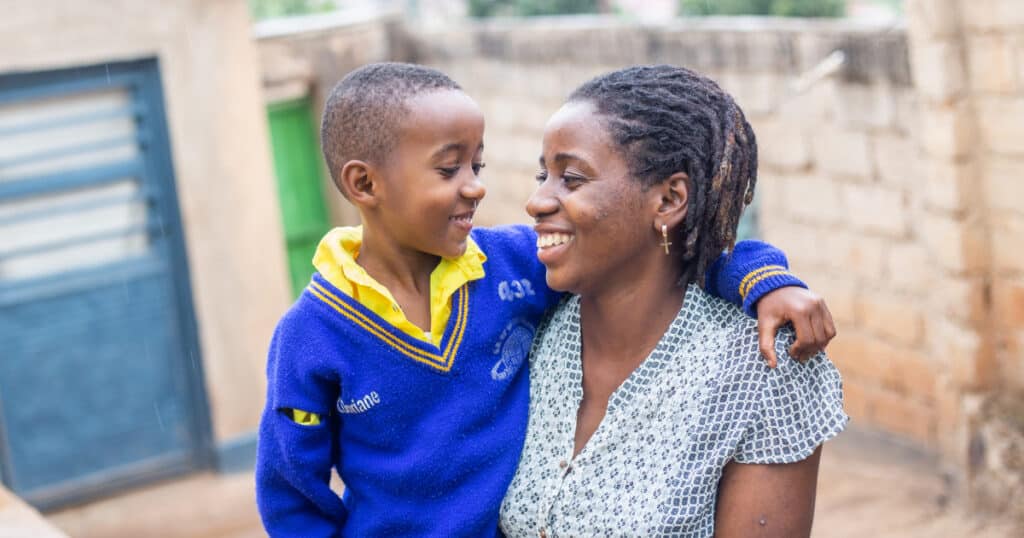
Jean Bizimana/Hope and Homes for Children
How does the Adolescent Mother Project work?
The Adolescent Mother Project supports young women who’ve been rejected by their communities. We help them get back on their feet, into school, and onto a path towards financial independence. This is done across four stages.
- Emergency Support First, we ensure adolescent mothers have safe housing, food and medical support.
- Psychological Support Then, we offer therapy, including group counselling and counselling for their relatives.
- Professional Support & Life Skills Once they’re ready, we support adolescent mums to complete high school or finish vocational training in hairdressing, tailoring or mechanics.
- Financial Support Lastly, we help adolescent mums set up small-scale businesses or complete internships, supporting them to have long-term income.
The Adolescent Mother Project is headed up by Claudine Murebwayire, one of our social workers in Kigali. As Claudine explains, supporting these young women is a chance to strengthen her community for generations to come:
“They are the future of the country. We have to help them and prepare them.”
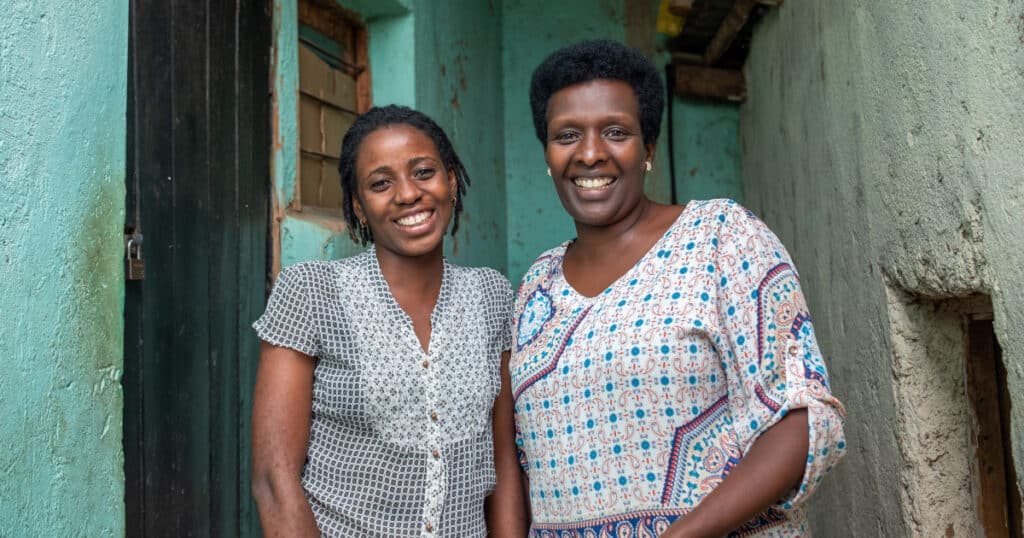
Jean Bizimana/Hope and Homes for Children
Shalon* and Nathalie* are two young women who’ve received support from our Adolescent Mother Project. Thanks to your donations, they found the strength to carry on and start a new chapter. As proud single mothers.
Shalon’s story – overcoming shame and adversity
“Now, when I say that I am a single mother I feel happy. And when I talk to others about it, I feel happy, not alone.”
Shalon is a young single mum from Kigali, Rwanda who was shunned from her family for four years after giving birth to her daughter, Doris*. Her mum, Viviane*, was also facing discrimination, and didn’t feel able to accept her daughter. As a result, Shalon dropped out of school to raise her baby all alone. She was only 15.
“When girls like Shalon get pregnant, society expects their families to feel shame,” explains Claudine. “If no one helps them, they could be at risk of abandoning their children on the street.”
Claudine invited Shalon to our group counselling sessions with other young mums. “It helped me understand I didn’t commit a crime,” says Shalon. “That I’m still a human.”
Viviane also attended parenting workshops and counselling sessions with other parents of adolescent mums. Soon after, she agreed to help raise Doris so Shalon could go back to school.
Now, Doris is six. She’s growing up happily and doing well in school. Shalon’s now studying to become a graphic designer – finally receiving the support she needs to pursue her dreams. As Claudine says:
“You can see a clear transformation for Shalon. She has her feet on the ground, and a vision for the future.”
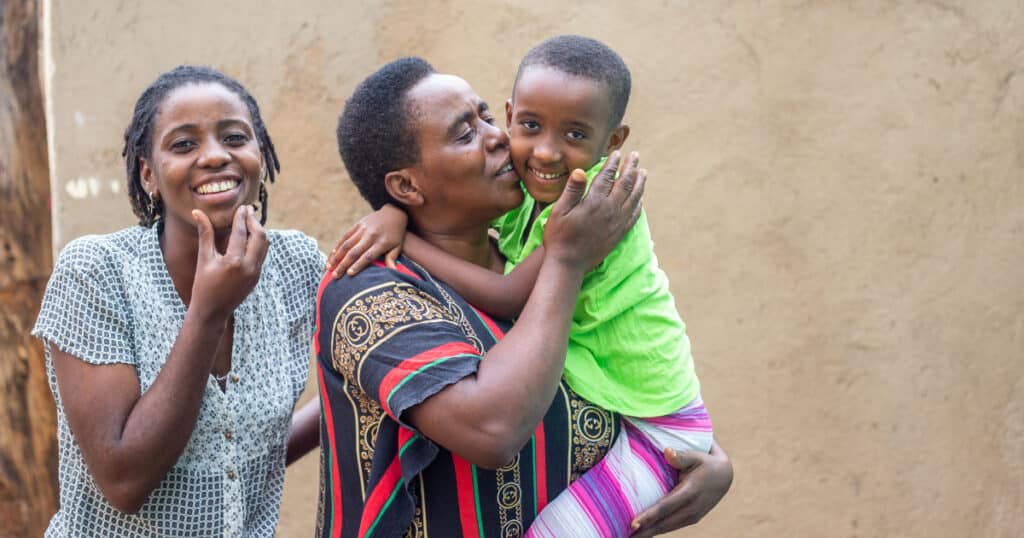
Jean Bizimana/Hope and Homes for Children
Nathalie’s story – protecting her child, pursuing her dreams
“Hope and Homes for Children has helped me to heal from my past and focus on my future. Together, we’re starting a new trajectory.”
Nathalie, 18, is a young woman who we’ve been supporting to raise her daughter, Austin*, as a single mum.
At eight, Nathalie was left to care for her three younger brothers, all alone. She grew up moving between foster families. Then, at fifteen, a man raped her. Seven months later, Nathalie found out she was pregnant.
“I feared going outside,” she remembers. “Two days later, my foster mother told me to wash my clothes and leave.” As a survivor of rape and unmarried pregnant woman, Nathalie was rejected by her community. She gave birth to Austin on her 16th birthday.
“I was so unhappy. My baby reminded me of how I’d been raped. Of how I was stuck in this situation, instead of in school. She never laughed, because I never laughed. She didn’t know how.”
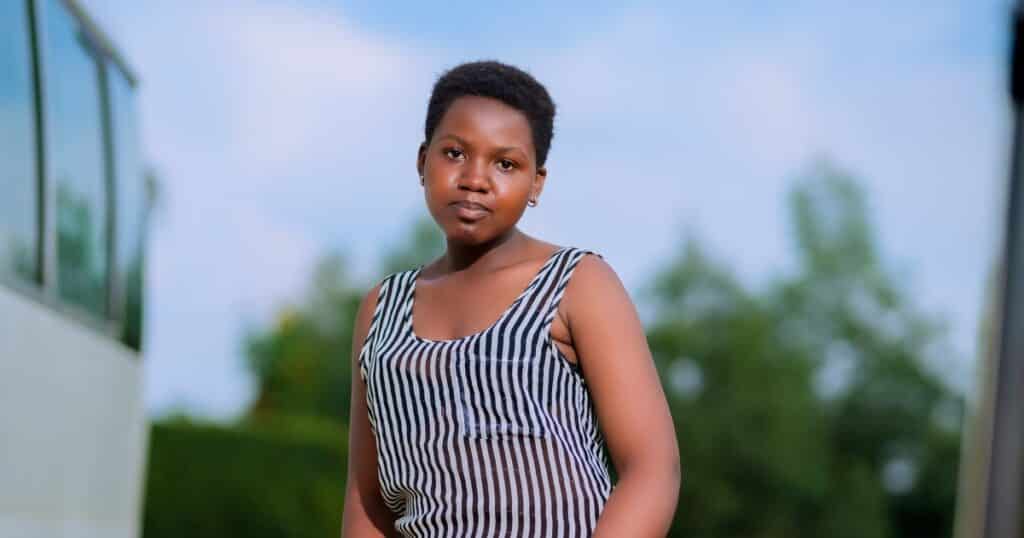
Richard Munyaneza/Hope and Homes for Children
Nathalie was invited by Claudine to our Adolescent Mother Project. She started receiving therapy and attending group counselling sessions. “It felt like a family,” Nathalie says. “After the counselling, I rang my mother and asked for help – could she look after my child so I could do the training? Today, she’s been looking after Austin for over a year.”
With help from our team, Nathalie returned to school to study mechanics. She ended up scoring the highest grades in her class. Twice. Now, at just 18, she’s working in a garage, paying her way and raising Austin, now two, with confidence.
“The Adolescent Mother Project gives financial, psychological and professional help to young women like Nathalie,” says Claudine. “That way, we can help keep families together.”
“I’m so happy with the life I’m living now,” says Nathalie proudly. “I’m able to love my daughter again. Together, we’re on a new trajectory.”
“Hope and Homes for Children has helped me to heal from my past and focus on my future.”
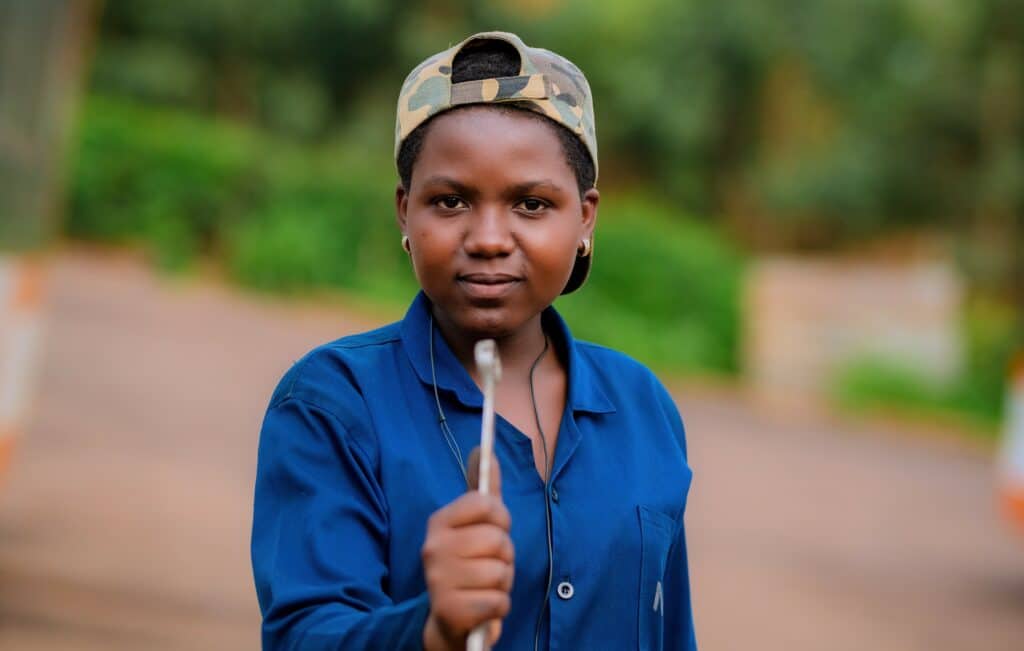
Richard Munyaneza/Hope and Homes for Children
Read more in our Book of Stories from Rwanda below or Download here
Thank you for supporting the Adolescent Mother Project
Since 2021, we’ve supported 252 young women through our Adolescent Mother Project. Young women like Shalon and Nathalie.
Now, our team is working on closing the last remaining orphanages in Rwanda. As of 2024, there are only nine orphanages still running. We urgently need your support to bring the last remaining children out of these orphanages and back to family.
Will you help bring hope back to family in Rwanda? Donate today.
* Names changed to protect identity.
This blog was updated in May 2025 to reflect our shift in language from “teenage mothers” to “adolescent mothers”, in line with our commitment to more respectful and non-stigmatising terminology.
Support our work Bring strength back to family
The post Empowering stories from the Adolescent Mother Project – “It felt like a family” appeared first on Hope and Homes for Children.
]]>The post Uwase’s story, from orphanage to adoptive family – “Someone to call mum and dad” appeared first on Hope and Homes for Children.
]]>April 7th marks the 30th Commemoration of the Genocide Against the Tutsi in Rwanda. On this day, we’re honouring the efforts of the Rwandan people in rebuilding their lives, communities, and nation.
We’ve worked in Rwanda since 2002. Now, there are only nine orphanages still in operation. Most children living inside them have disabilities, like Uwase. Our work is proving that it’s not only possible, but better for these children to be brought back to family.
Will you help our team bring children in orphanages in Rwanda back to family? Donate today.
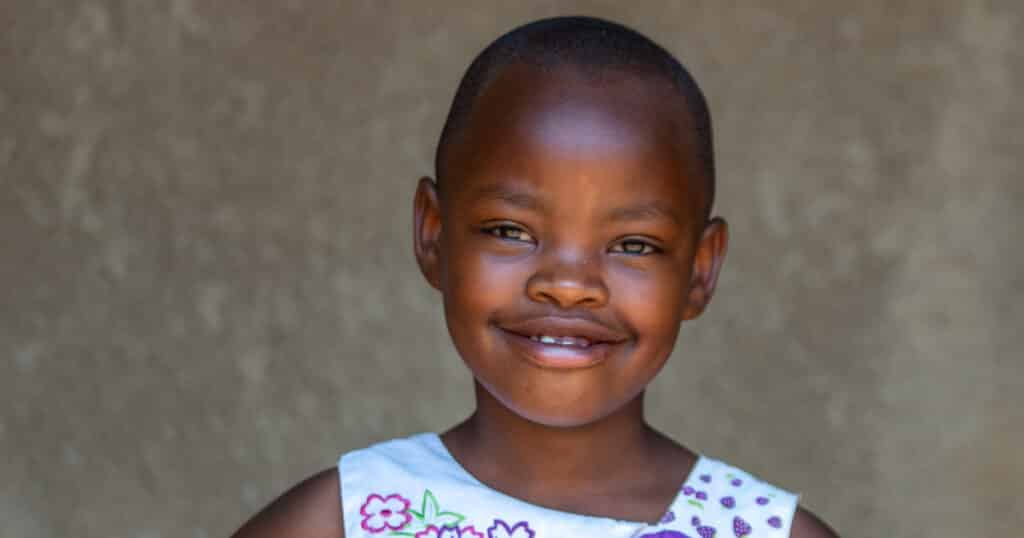
Jean Bizimana/Hope and Homes for Children
Uwase’s story
Uwase, pictured above, was abandoned as a baby. She was born with a disability in her leg, and then left in the streets of Rwanda’s capital, Kigali, at ten months old.
The authorities couldn’t find her parents, so they took her to an orphanage. She lived there for three long years.
Why children with disabilities end up inside orphanages
Around the world, families struggling with poverty, disability and discrimination sometimes make the desperate decision to abandon their children, believing they’ll be better cared for in an orphanage.
Unfortunately, this isn’t the case. Instead of helping children, orphanages put them in harm’s way.
During her time in the institution, Uwase was miserable. The staff didn’t help her with her disability, let alone teach her to walk. Unable to move around, she couldn’t interact or join in any games. Instead, she was left alone and ignored. Just existing. Day in, day out.
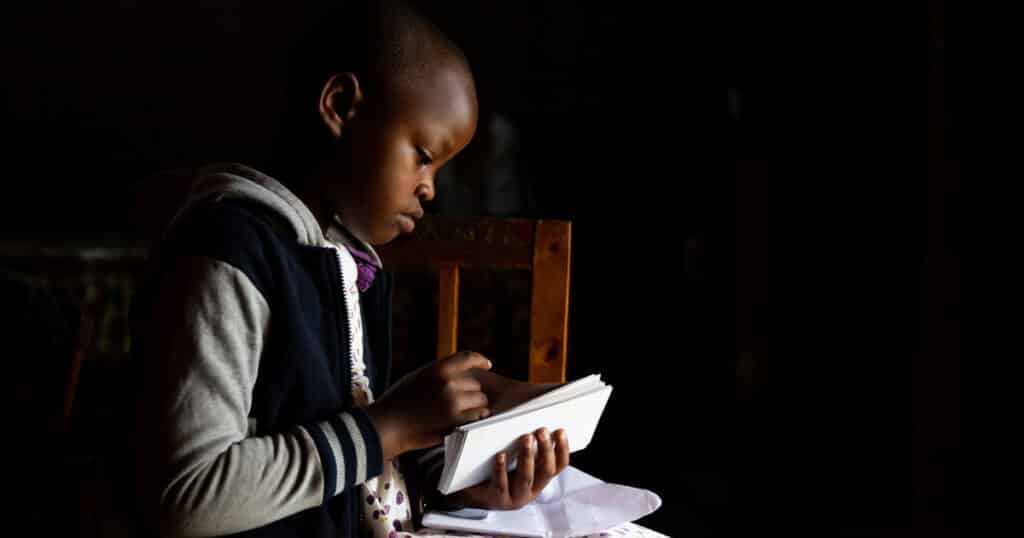
Jean Bizimana/Hope and Homes for Children
How we can bring children back to family
Like Uwase, most children still in Rwandan orphanages have disabilities.
“There are many misconceptions surrounding disabilities, like that children with disabilities are in some way burdens on their families,” explains Richard Munyaneza, Advocacy, Communication and Safeguarding Coordinator of Hope and Homes for Children Rwanda. “These false beliefs have permeated policy and decision-making processes.”
As a result, there’s a lack of support for parents of children with disabilities in Rwanda. All too often, they’re told their children will be better off in orphanages. But there’s always a better way.
Alongside the Rwandan Government, we’re standing up for the rights of every child to grow up in a safe and loving community. And we’re supporting families to bring their children home from orphanages, as at least 80% have living parents. And, for children who don’t, we’re recruiting loving adoptive parents. Just like we did for Uwase.
Finding family for Uwase
Unfortunately, no one could trace Uwase’s birth parents, so we started searching for a new family.
Gatete* and Uwimana*, a local couple with children of their own, heard about our work and quickly reached out.
As Uwimana explains:
“When I see my children growing up together with me and their father, with someone to call mum and dad, and compare that to seeing a child in an orphanage being cared for by different paid staff without a mother or father, it’s very sad. That’s why I made the decision to invite Uwase to join our family. So she can have someone to call her mum and dad.”
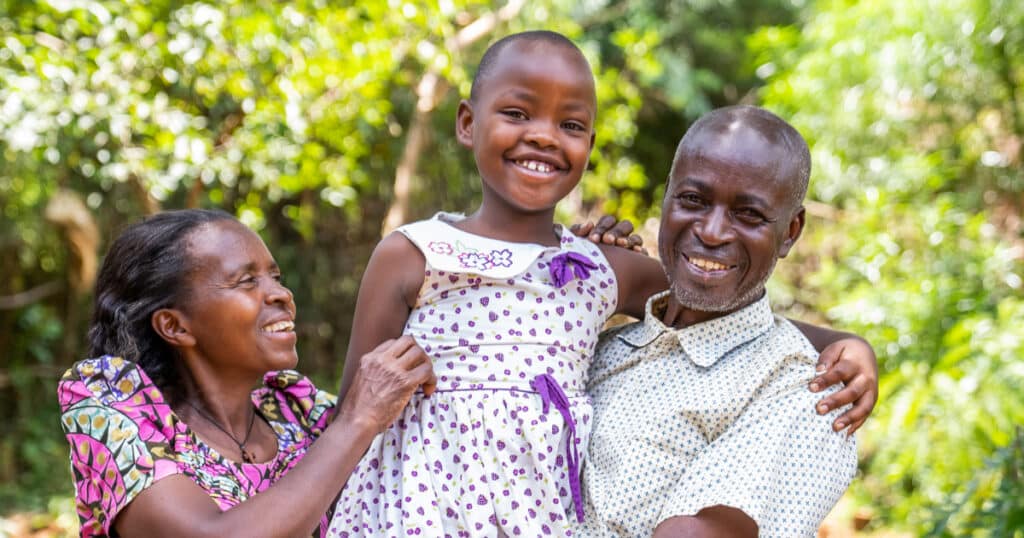
Jean Bizimana/Hope and Homes for Children
Creating a new family
After Uwase turned three, our team provided Gatete and Uwimana with specialist training to become adoptive parents.
“The training from Hope and Homes for Children really helped me to care for Uwase,” Uwimana says. “Even though I was already a parent, it helped me a lot. I was advised to love Uwase even more than I love my own children, to protect her from anything that might traumatise her any further.”
Before long, we were taking Uwase to her new home. At last, she was out of the orphanage and back to family.
Happy and loved
“Since living with us, Uwase is much happier,” Uwimana says. “She plays with other children and spends time outside. That means she’s much more aware of what’s happening in the community. She learns and gains so much more than other children shut away inside orphanages.”
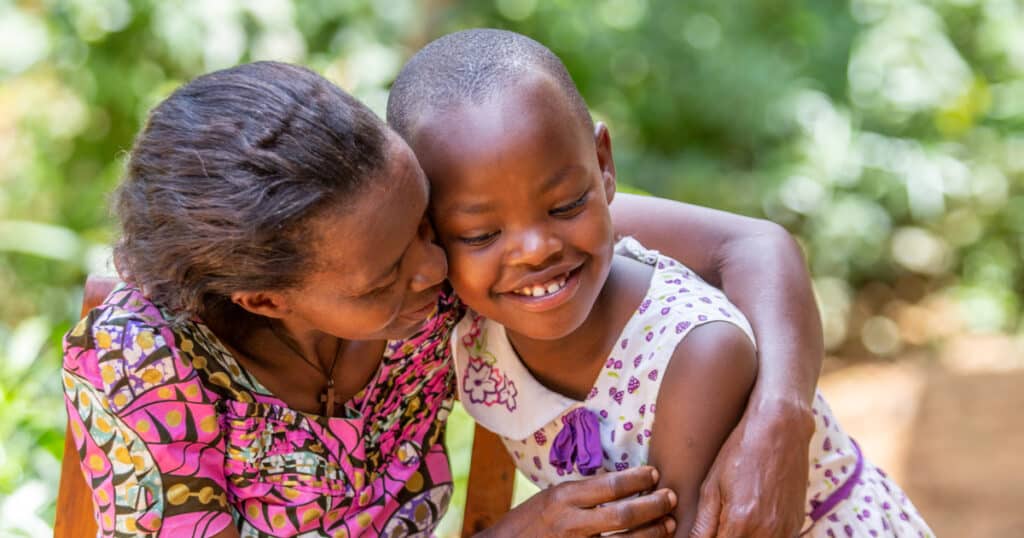
Jean Bizimana/Hope and Homes for Children
Our team continued to support the family and ensure they had everything they needed. We provided money to cover Uwase’s medical treatment and physiotherapy each month, for a year and a half. We also gave them counselling sessions and referred them to local leaders and health services for additional support.
And most importantly, thanks to life in her family, Uwase finally learned to walk.
“If she’d stayed in the institution, maybe she never would’ve learned to walk,” says Uwimana. “She was always alone in the dormitory, with noone to take care of her. But now things are different. It’s such a joy to see Uwase so happy and loved in my family.”
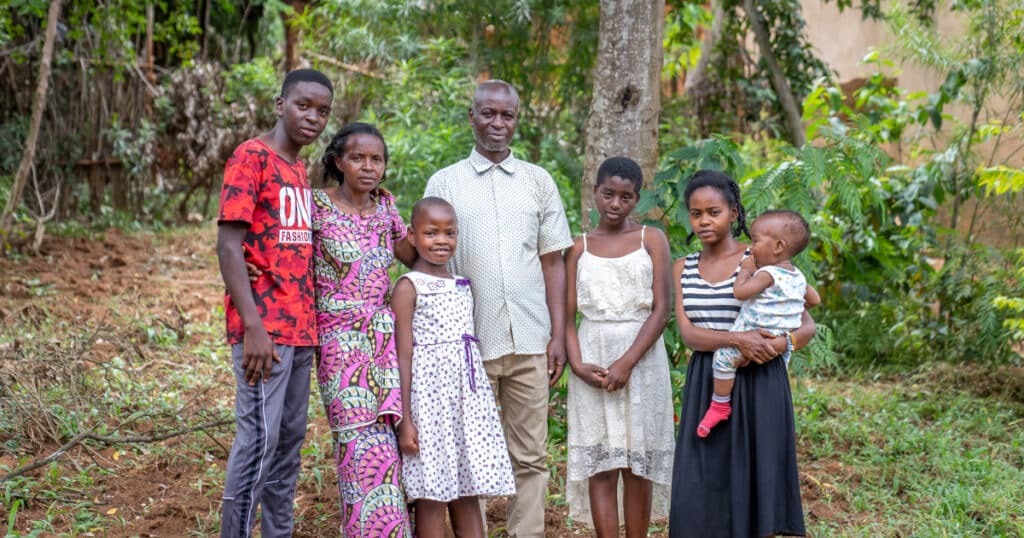
Jean Bizimana/Hope and Homes for Children
Closing the remaining orphanages in Rwanda
Uwase’s orphanage once had 26 children living inside.
Of those 26 children, we reunited four children with their families, found foster families for thirteen of them, and supported nine young adults to adjust to living independently. The orphanage is now closed.
Now, Rwanda is on the cusp of being orphanage-free by 2026. As of March 2024, there are only nine orphanages still operating. Our team is working with the local government to close them and bring every child in Rwanda back to family.
Will you help us get every child living in orphanages in Rwanda back to family? Donate today.
* Names changed to protect identity.
Support our work Bring separated children back to family
The post Uwase’s story, from orphanage to adoptive family – “Someone to call mum and dad” appeared first on Hope and Homes for Children.
]]>The post 2023: a year of transformation for children and families appeared first on Hope and Homes for Children.
]]>Together with supporters, families and young people, we’re showing a better world is possible. Read our round up of the last 12 months.
Closing orphanages, transforming care
Over the past twelve months, we and our partners have celebrated the closure of seven orphanages.
In Romania, the whole of Ilfov Country is now institution free thanks to our work in partnership with the child protection department.
Simona, Head of Child Protection in Iasi, Romania
"Hope and Homes for Children brought change and a new perspective – trust, devotion and above all, that quality that all social workers should have but that cannot be learned in school – humanity."
Trust, devotion and humanity: A new partnership, a new perspective
In Nepal, as the result of supporting and equipping our partners to train, sensitise and lobby local municipalities over the last two years, those authorities have now closed two children’s homes in Kathmandu Valley. More than 500 children have been supported to escape the clutches of institutions in the year so far. Our persistent advocacy has helped the government in Bulgaria commit to close the last remaining four children’s institutions – and what’s more, they’ve asked our Bulgarian team to lead on providing technical and practical support during this process.
Supporting families in crisis
Due to our work supporting families in crisis, more than 9,000 children across ten countries who might otherwise have been separated from loving families and placed in abusive, neglectful institutions, are now safe. In support of this, the first foster care pilot is now underway in Nepal to further strengthen family care alternatives. And in South Africa, we’re training young women to open their own businesses and become economically independent, as part of our inspirational ‘active family support’ model.
Our team in Ukraine continue to display incredible fortitude – helping particularly vulnerable children and families deal with trauma, and keeping families together. We’re providing counselling, therapy and material support, as well as finding new homes and foster families for children with nowhere else to go.
Occupied for 36 days: One Ukrainian family's story
After unimaginable loss and destruction, our Ivankiv Mobile team of one social worker, two psychologists and one doctor supported Mariia* and her granddaughters to stay safe, and together.
Occupied for 36 days: one family’s story of loss, destruction and hope
Working alongside governments and the EU to ensure no child is left behind
Our work in India has received a significant seal of approval from USAID, who have committed to funding us and our partners, as we support state government efforts to transform care provision, especially in inclusion for children with disabilities. In Rwanda, our team continue to pioneer care reform for children with disabilities. We recently secured long term funding from the EU to ‘transform disability-inclusive child protection and care for vulnerable and marginalised children and youth’.
Winning hearts and minds, alongside young people from care
In September, we co-organised the Asia Biannual Conference for Care Reform in Kathmandu. With over 230 in person participants and around 100 online participants attending from across the region and globally, this was a hugely successful way to engage policy makers and civil society in the fight to transform child care. We were delighted that care-experienced young people played a central in shaping the conference, and that we could support by providing a platform for their voices to be heard as they called for change.
"For two days I cried remembering my home"
Young care experienced people are raising their voices and taking on the fight – we must listen
The rescue: how we’re supporting 28 children rescued from an abusive orphanage
Impact on the biggest stage
Systems reform is the most sustainable way to have large scale impact. In 2023, as a result of our direct contribution
- the South African government committed to having a National Deinstitutionalisation Policy in place by the end of the year. Together with the South African Policy and Development Nexus, we’ve helped develop and consult on the drafts.
- The Nepalese government has included ‘deinstitutionalisation’ in their Five Year Periodic [Development] Plan for the first time ever.
- In Moldova, we have helped review, and make recommendations for, the regulatory framework for alternative care services.
What’s next?
In 2024 we want to see even more landmark moments where governments, law and policy makers, and social workers show that they believe family based care is best for all children. So we’ll continue to expand our reach – we’ve recently partnered with a local organisation in Kenya to provide technical support to a pilot project demonstrating that change orphanage to family care is possible in Nakuru Country.
None of this would have been possible without the generous support of people like you – who share our belief that every child deserves the love and belonging of a safe, supported family.
Thank you!
The post 2023: a year of transformation for children and families appeared first on Hope and Homes for Children.
]]>The post 3 incredible stories of love from parents worldwide appeared first on Hope and Homes for Children.
]]>All too often, interconnecting factors like poverty, access to healthcare and education, and a misrepresentation of the orphanage system mean parents are unnecessarily separated from the children they love. Today, and every day, we support parents and fight to keep families together. Because children deserve families, never harmful orphanages.
Here are 3 incredible stories of love from parents worldwide, and the work we have done to support them.
Fighting to keep their family together
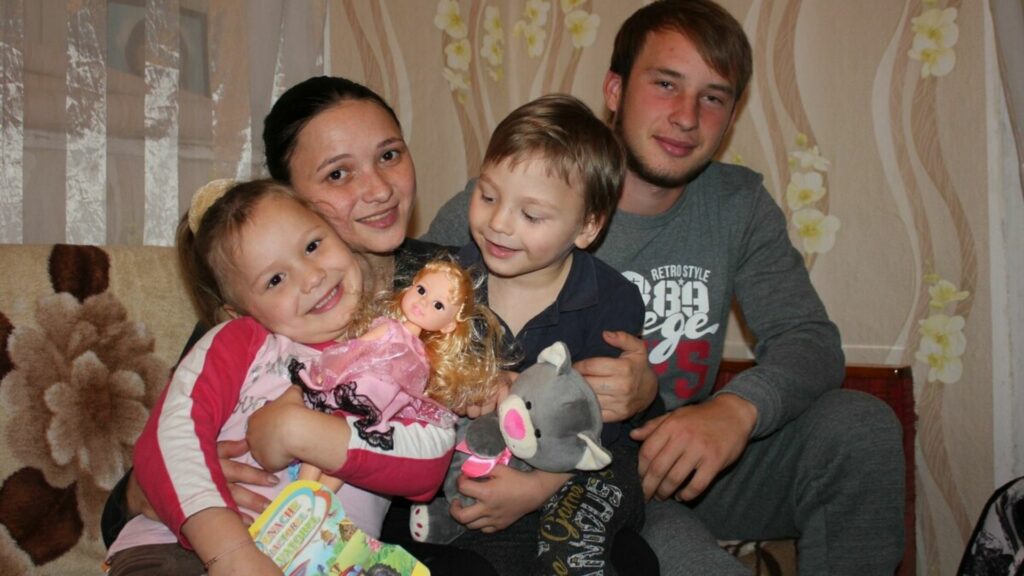
Vasilica* was only four months old and his sister, Ecaterina*, was just one when they were sent to live in the orphanage. Vasilica was born prematurely with cerebral palsy. Poverty and discrimination made it very hard for his mum, Ana*, to care for him alone, without adequate support.
The authorities thought both her children would be better off in an institution. But orphanages don’t protect children, they harm them.
Ana battled for two years to bring her children home again. Through our local partners, CCF Moldova, we made sure she had the practical and emotional support that she needed to succeed. “I saw that Ana loved her children and she fought for them,” says Natalia, the experienced social worker who stood by her, every step of the way.
In the orphanage, Vasilica spent long hours alone in a cot with no one to play with him, encourage him or love him. Today, reunited with his family, he’s a very active, much-loved little boy who likes building tall towers with his wooden blocks and playing chase with his sister.
Creating a new family for Uwera*
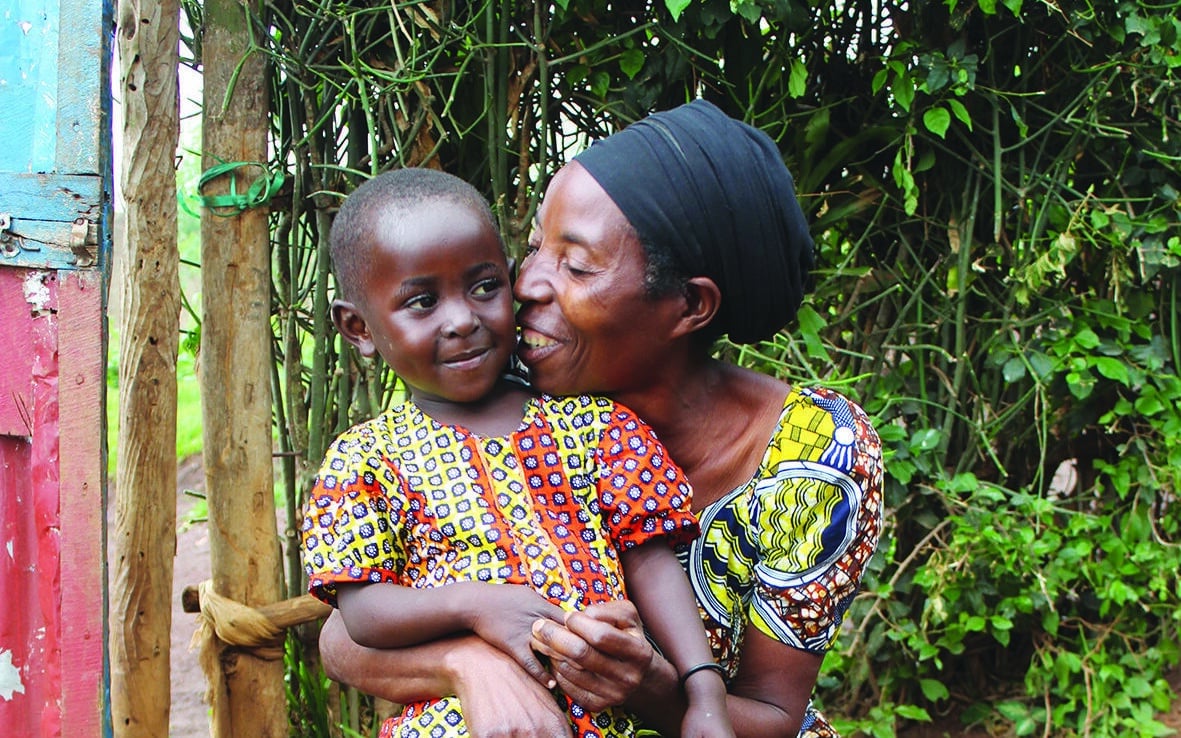
One evening, Atete heard cries from the trees near her yard. There, she found Uwera, a newborn baby girl, abandoned on the ground. Atete scooped Uwera up, took her home and cared for her for three weeks while the community tried to find Uwera’s parents. Once it was clear that no trace could be found, the authorities insisted that Uwera must be taken to an orphanage. Atete was heartbroken. She knew that the last thing an orphanage would provide was the first thing that Uwera needed: someone to love her.
For two years, Uwera struggled in terrible conditions in two different orphanages. She slept on the floor with insects crawling over her and she was fed just once every 24 hours. Shouted at if she made the slightest noise, Uwera stayed silent and struggled simply to survive.
Luckily, following a new commitment by the Rwandan Government to end the use of orphanages, our specialist child protection team in Rwanda was able to work with their local authority partners to close the orphanage and give Uwera back her childhood, reuniting her with Atete.
Uwera has been with her new family for 3 years now. Today, she’s walking and talking, running and jumping. Atete’s older children love to play in their little home. Soon Uwera will begin nursery alongside the other children in her community, and Atete has applied to officially adopt her so that they’ll never be separated again.
Rebuilding their family with love
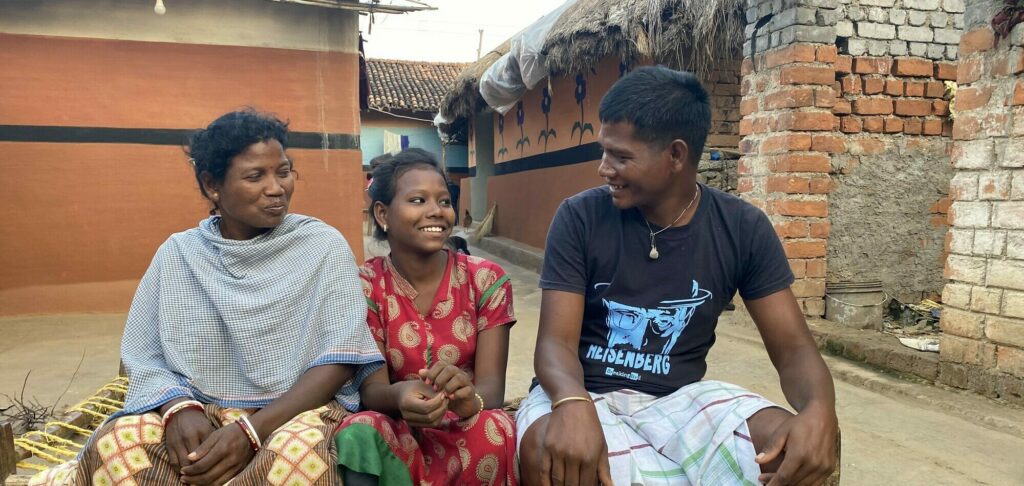
One morning in 2013, Devi was travelling with her mother when their train stopped at a busy railway junction. Without telling her mum, Devi jumped down to fill up her water bottle. While her back was turned, the signal changed and their train pulled out, leaving Devi behind.
For the next seven years, Devi was moved from institution to institution, but no effort was ever made to trace her relatives and reunite her with her family.
In 2015, Devi was sent to live in a shelter for girls in the heart of Ranchi City, the capital of Jharkhand state. This is where she first met Neepa, a social worker with the development NGO, CINI. With support from Hope and Homes for Children, Neepa and her colleagues worked with Devi to recall details about her childhood, contacting local authorities and visiting station after station and asking local people if they knew of a child going missing seven years ago. Until, finally, they found her family again.
When Devi’s father saw her again after seven long years, tears of joy rolled down his face. Sadly, Devi’s mother had never returned but her father now had a new partner and a son. Devi’s oldest sister lived with them too.
The day that Devi officially rejoined her family was very moving for everyone. “Devi cried with emotion as she struggled to find the confidence she needed for the next stage of her extraordinary journey,” Neepa said. “Then she hugged her parents and smiled back at us as she stepped back into a life of love, affection and family care again at last,” she remembers.
How we support families
We keep families together, we reunite families, and we create new families. Family, children and parents are at the heart of everything we do. The three stories shared above show how our global teams work tirelessly to keep families together.
We believe that a child is always better off as part of a strong, supported family. That’s why we’re working to close the doors of orphanages forever so that no child has to be separated from their parents and face the long-lasting harm orphanages cause.
If you would like to donate to our work supporting loving parents and keeping families together, you can do so here. Thank you.
The post 3 incredible stories of love from parents worldwide appeared first on Hope and Homes for Children.
]]>The post Meet Rugwiro*: the foster father going above and beyond to protect children appeared first on Hope and Homes for Children.
]]>Read part one of Richard’s blog here
We were only able to fully close an orphanage in the Gatsibo district due to the willingness of local community members to foster the children and young adults who we couldn’t reunite with their biological families. One of these couples is Rugwiro* and his wife Masaro*, who agreed to foster a 24-year-old young man called Ndoli*. Ndoli has epilepsy and mental impairment and had been living at the orphanage for many years, since he was young.
Rugwiro has always had a passion for supporting vulnerable children. Having lost his parents at a young age, he grew up caring for his younger siblings. Eager to help children in his community, he became a ‘Friend of Families’ – a community-based volunteer in charge of upholding children’s rights within their local area. And was later elected to be the leader for the wider sector.
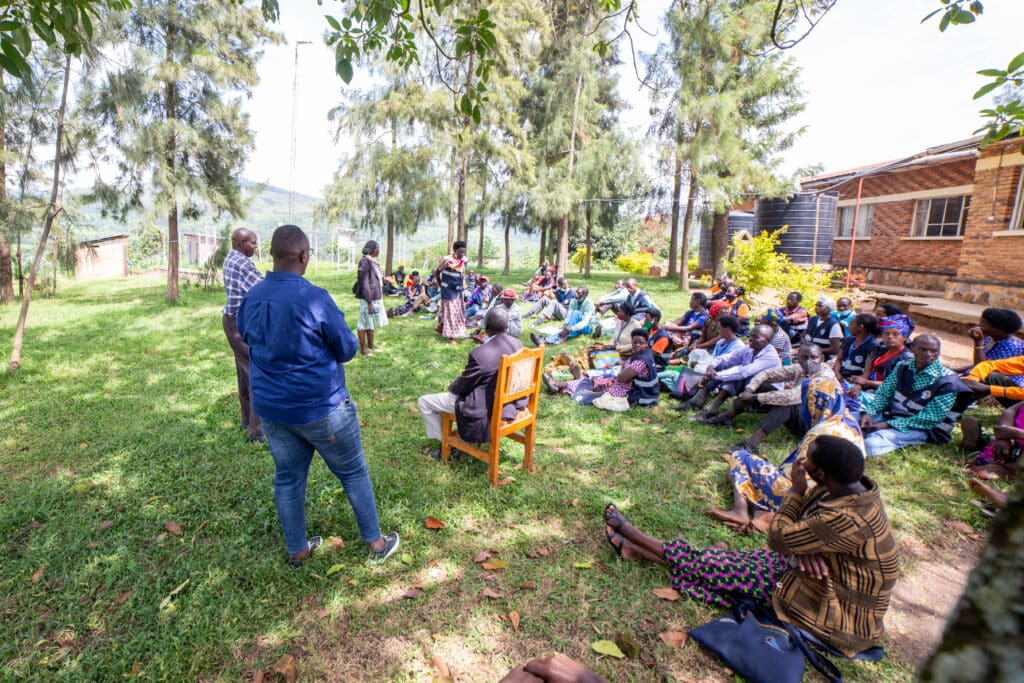
In his role, Rugwiro supports families to stay together, helps resolve family conflicts, and encourages families to keep their children in school and fulfil children’s rights.
Still, Rugwiro wanted to do more to protect children. So, when he heard from local leaders that Hope and Homes for Children was recruiting foster families for children with disabilities, he offered to become a foster parent. We provided him with all the support and training he needed, and soon Rugwiro and his wife were welcoming Ndoli into their home.
When we asked Rugwiro why he wanted to adopt Ndoli, he told me:
“I cannot stand to see children suffering; they are our future as a country. When I was a child, I was supported by someone from the community – he forged me into the person that I am today. It is my turn to give back the kindness I have received in my past.”
When he first joined the family, Ndoli was not very communicative or responsive and was unable to do simple tasks. But after living with his new family for a few months and getting the individual love and attention he needed, he soon learned how to do new things, like helping with household chores, feeding the family cow, and harvesting the fields with his new dad.
Being more active made a big difference and helped improve his speech and memory. Now he can communicate more easily and even remember details of his life before he went to the orphanage. For example, sometimes when he sits with his foster parents, he recalls songs he sung when he was a young boy. And he counts from one to ten, suggesting that he once went to primary school. Best of all, since living with his new family, Ndoli has seizures far less frequently. And when he does have them, he gets lots of love and care.
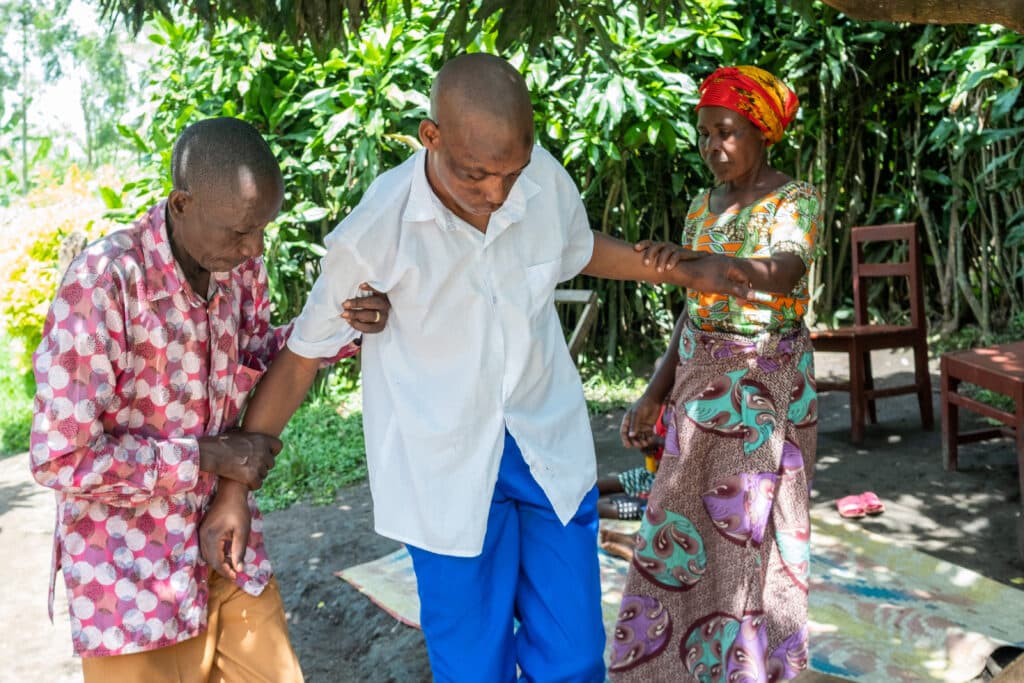
Rugwiro is a proud foster parent:
“We have set an example. Ndoli is one of my greatest achievements. Neighbours always ask me how I done this. They are amazed by what we have achieved by receiving him into our family. We encourage others to foster vulnerable children as well, especially children with special needs.”
Cover image: Foster parents Masaro* and Rugwiro*. Credit: Jean Bizimana / Hope and Homes for Children
Richard Munyaneza is Advocacy, Communication and Safeguarding Coordinator at Hope and Homes for Children Rwanda
The post Meet Rugwiro*: the foster father going above and beyond to protect children appeared first on Hope and Homes for Children.
]]>The post Turning the tide for children with disabilities appeared first on Hope and Homes for Children.
]]>This vibrant community hub (pictured above), run by the inspirational Médiatrice Mukasharangabo and her daughter, Clementine, used to be an orphanage for children with disabilities.
But in 2018, our team began working with our local authority partners to close the orphanage and reunite the children with their parents or other close relatives by making sure that they have the training and support to care for their children at home.
Together with local government, the National Council for Persons with Disabilities (NCPD) and the National Child Development Agency (NCDA), we found all 26 children loving families and closed the orphanage.
Out of the 26 children and young adults with mental and physical disabilities in the institution, we successfully reunited 19 with their biological families; placed two with their extended family; and for the five children and young adults where this wasn’t possible, we found them loving foster families, like Ndoli*, whose story you can read overleaf.
Most of the old orphanage buildings were knocked down, and in their place, we built a vibrant new community hub. Médiatrice and her daughter now happily run the new centre, which offers an inclusive Early Childhood Development (ECD) for children aged 3-6 years and children with disabilities, as well as vital support services for children with disabilities, including occupational therapy, physiotherapy and additional needs education.
It is so wonderful to see so many children now thriving thanks to these services. For example, with the help of physiotherapy, four-year-old Kenis*, who has cerebral palsy, has learned to sit up for the first time.
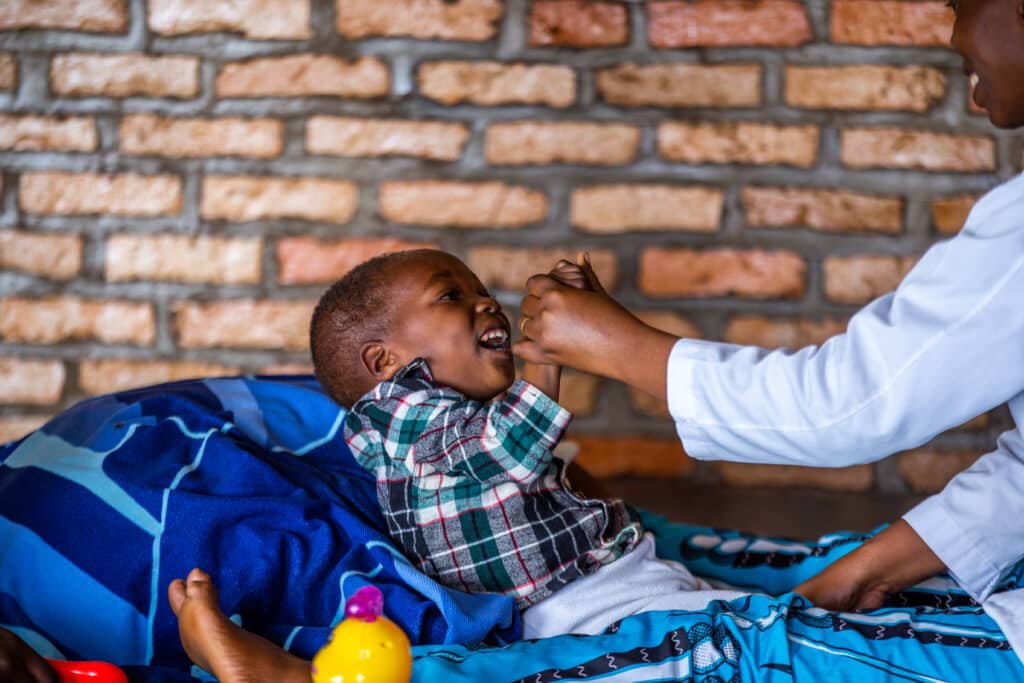
Occupational therapy classes have helped 10-year-old Singiza*, who has epilepsy and learning difficulties, learn to make things using beads.
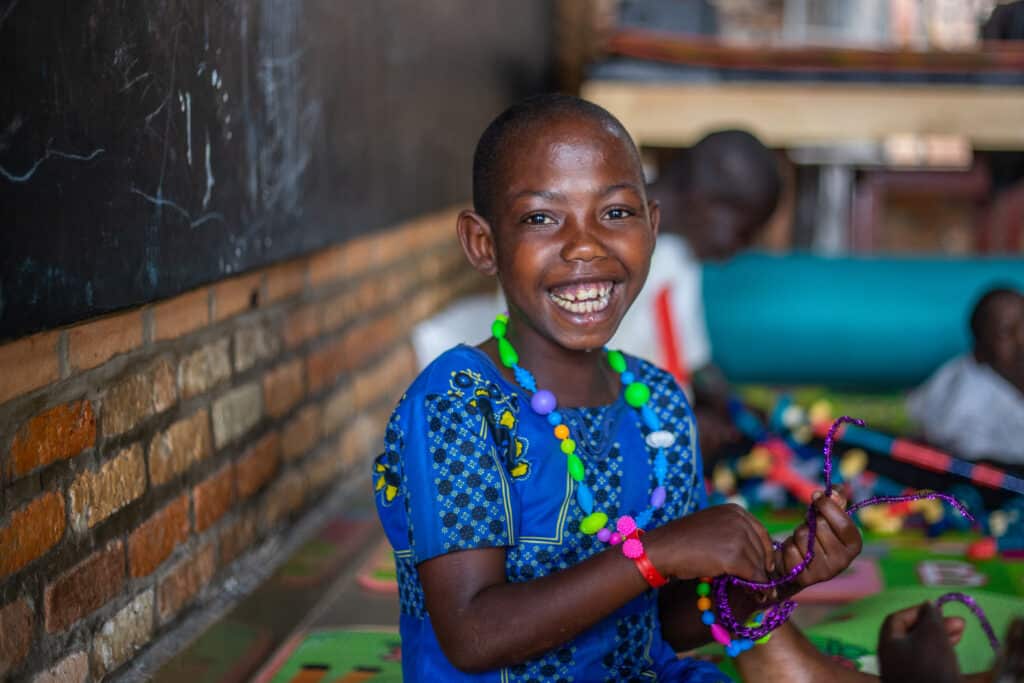
And six-year-old Juju*, who has paraplegia, has learned to write. All vital milestones in their development which they might not have reached otherwise.
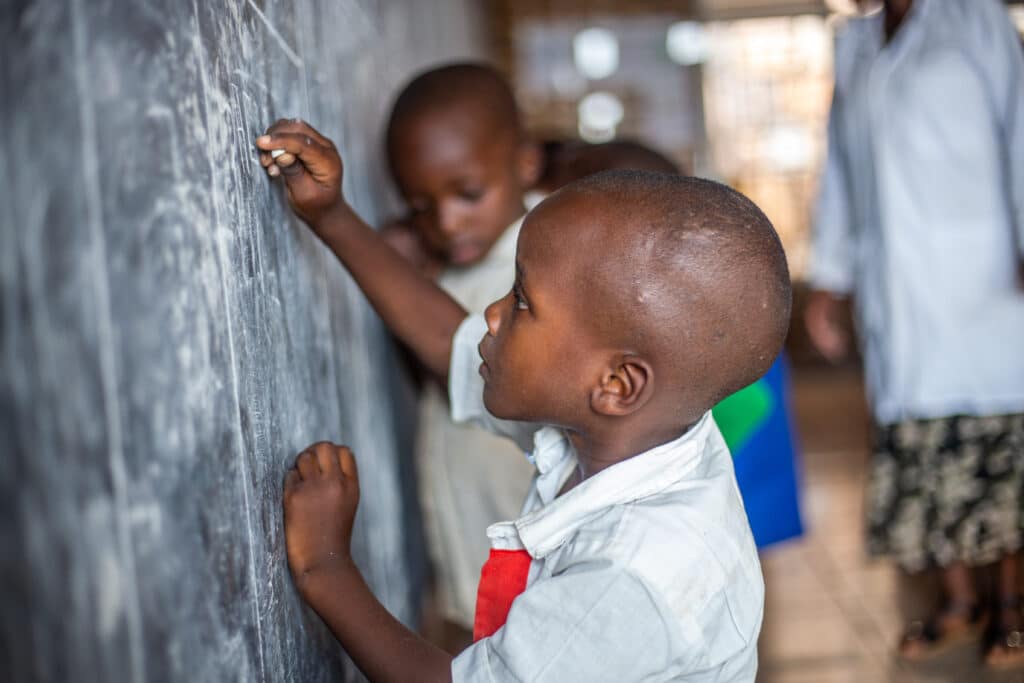
And children without disabilities are also benefitting greatly from their classes and nutritious meals, like three‑year-old Mahoro*, who always has a smile and loves to play and dance with the other kids.
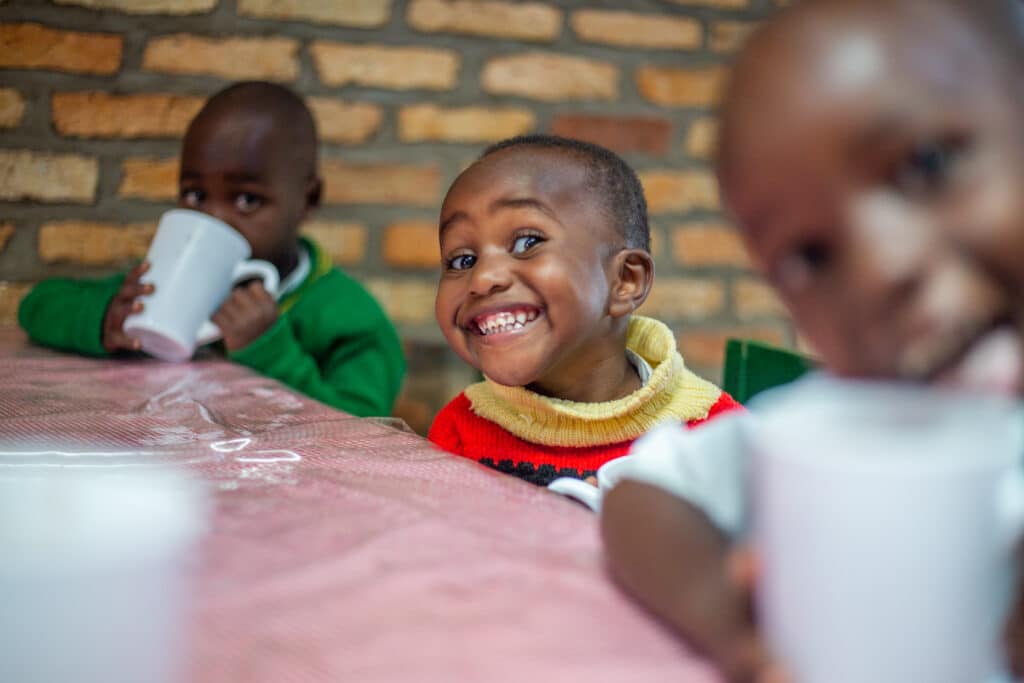
You can read part two of Richard’s blog, which introduces Rugwiro, the foster father going above and beyond to protect children here.
Richard Munyaneza is Advocacy, Communication and Safeguarding Coordinator at Hope and Homes for Children Rwanda
The post Turning the tide for children with disabilities appeared first on Hope and Homes for Children.
]]>The post Trailblazers: how Rwanda is leading the way for an orphanage-free Africa appeared first on Hope and Homes for Children.
]]>Last year, history was made in our country. With the unanimous passing of the Kigali Declaration in June 2022, the Commonwealth nations pledged to end the institutionalisation of children once and for all. That’s 54 nations saying no to orphanages, the separation of families and the mistreatment of children – a revolution across the Commonwealth that starts in Rwanda.
Now, the next key milestone is for us to make Rwanda orphanage-free by 2026. And with your continued support and donations, we can make this happen.
Our journey so far
Over the past twenty years, Hope and Homes for Children has been working in Rwanda to pursue this goal. From supporting struggling families to creating community spaces, from reuniting families to deinstitutionalising children with disabilities, our approach has been dynamic, inclusive and pioneering.
Supporting individual families
In 2002, we began by supporting selected families most in need throughout Rwanda to prevent children from ending up in orphanages. Our society still bears the tragic scars of the genocide against the Tutsi in 1994. In its wake, there were many children growing up under the care of frail and elderly grandparents, struggling single parents, or often, their elder brother or sister. We did all we could to help families create a healthy home environment – from building houses for children and families that were homeless, to helping them access education and healthcare and improve their income and family relationships. Our social workers listened to each family’s needs and aspirations and celebrated their strengths. Together, they paved the way for their journey from vulnerability to self-reliance – the first step on the road to an orphanage-free Rwanda.
Introducing community hubs
Through our work with individual families, it quickly became clear that many families did not have access to vital services they needed. So in 2005, we expanded our work to reach even more families by introducing our ‘community hubs’ – centres in the heart of the community to provide whatever services families need most, from early childhood development to parenting skills workshops. This community-based approach builds social cohesion, prevents family breakdown and supports children, people with disabilities and the elderly.
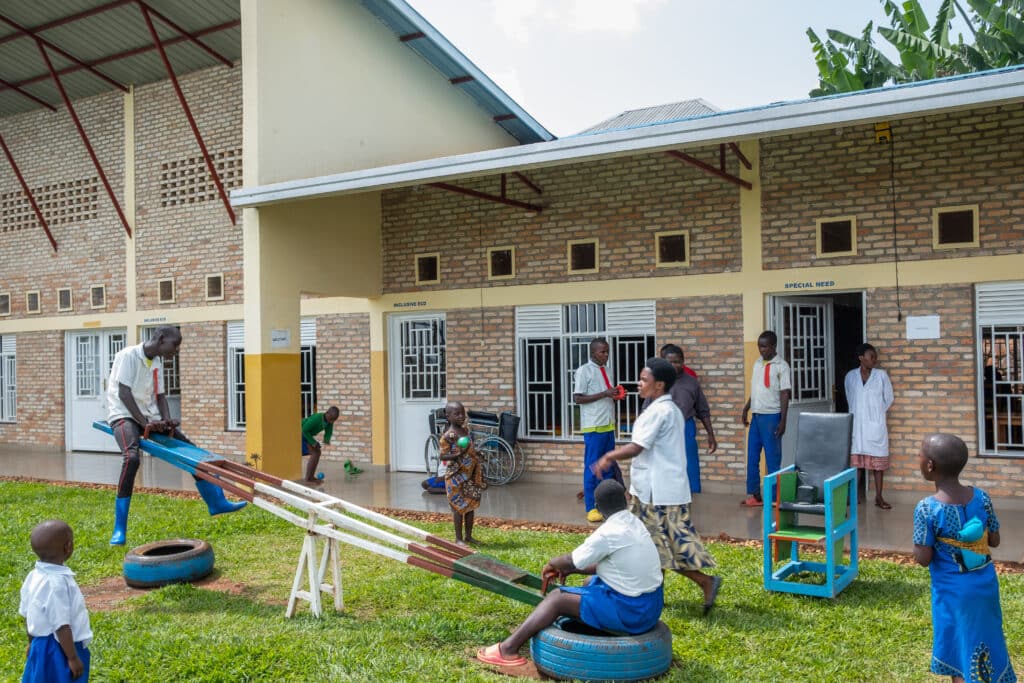
National commitment to closing orphanages
Our work took a big turn in 2010 when we teamed up with the Ministry of Gender and Family Promotion for a project to end the institutionalisation of children in Rwanda. With this project, we could put an end to a practice dating back to 1954. After kickstarting the first professional closure of a children’s institution and launching a survey of children’s institutions across the country, in 2012 the Rwandan administration approved a national strategy for childcare reform.
As a result of this policy, over 91% of children have been reintegrated with their families. Now, Rwanda has only 10 orphanages left, down from 41. Numbers are important, but the smiles, happiness, and sense of belonging that children experience with life in a family speak volumes.
Closing orphanages for children with disabilities
Since then, the national agenda for childcare reform has become even more inclusive. 2019 saw the first closure of an institution for children with disabilities in Rwanda. These former institutions have been turned into vibrant community hubs, offering support and learning opportunities to hundreds of disabled children, like Peter* (pictured above), who were previously left at home with no care or stimulation. This has been championed by parents of children with disabilities who have seen the many gaps in childcare facilities.
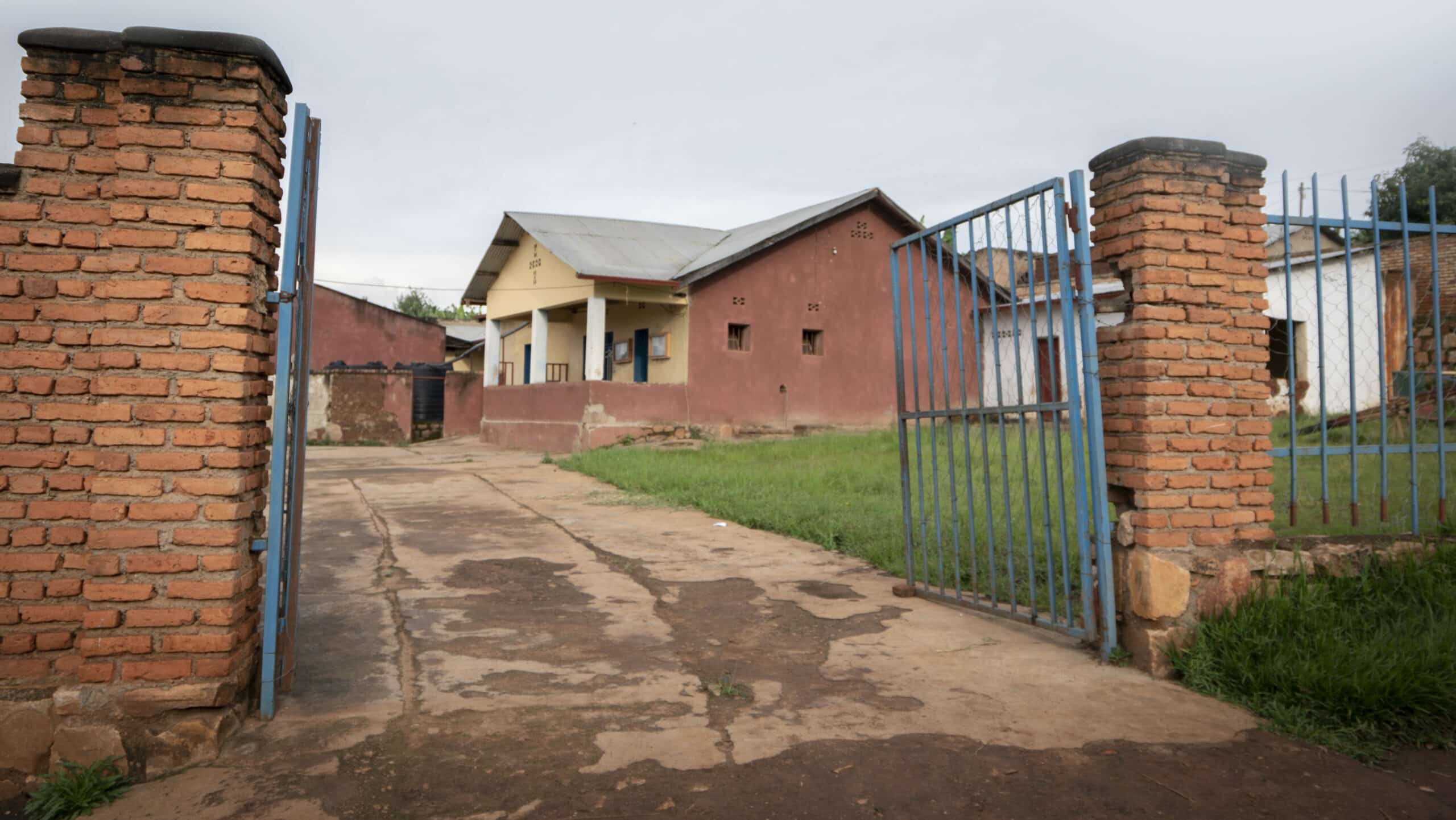
The road ahead
The road ahead remains long, however, and there’s still more work to be done. Without the Rwandan government’s strong will, its dedicated social workforce, and money available for the entire process, the transition of children from institutions would not be possible. To ensure the legacy of the 2022 Kigali Declaration, there’s now an urgent call for more support for Rwanda to complete its mission and become a vibrant learning hub.
Rwanda’s roadmap to an orphanage‑free future is already being shared with other countries, and we can expect that the demand for support will continue to increase. Our team has already hosted a number of Learning Exchanges with Kenya, Uganda, Zambia, Malawi, South Africa, and Ghana, with some new Hope and Homes for Children’s initiatives launching in Kenya this year.
Our work in Rwanda goes beyond borders, setting a standard for countries throughout Africa and around the world. Now, twenty years since Hope and Homes for Children began working here, Rwanda is a pathfinder nation for ending child institutionalisation.
We need your support to pursue this momentum. So far, our work in Rwanda has helped to support 150,000 children and family members. That’s 150,000 smiles, 150,000 dreams, 150,000 people who deserve a united home. If we continue down the trail that’s being blazed by Rwanda, we can do the same for the 5.4 million children still suffering in institutions, and their families.
And that’s exactly what we plan to do.
Cover image: 16-year-old Peter* is now thriving thanks to the learning opportunities available at his local community hub. Credit: Jean Bizimana / Hope and Homes for Children
Innocent Habimfura is Country Director, Hope and Homes for Children, Rwanda
The post Trailblazers: how Rwanda is leading the way for an orphanage-free Africa appeared first on Hope and Homes for Children.
]]>